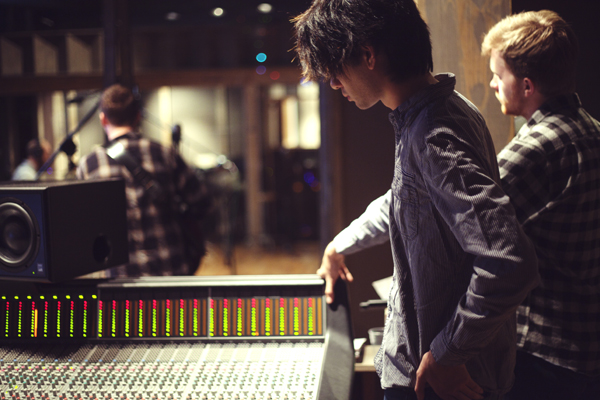Part 1 of 2
Split Decision
If you’re a musician that “plugs in,” then you know that the sound you hear coming out of your amp can either inspire you or make you want to hang up your guitar or bass in disgust. And yeah, this article is mainly written for electric guitarists and bassists because so much of these instruments’ sonic character is attained through amps, amp modeling and effects. You know what I’m talking about – there’s a thrill of getting that perfect tone – when it’s right, you just can’t stop playing. In this article, we will discus the pros and cons of recording live versus applying software plug-ins during post-production. And who knows, we might even discover a method that satisfies both sides of the aisle…
CAPTURING THE LIVE PERFORMANCE
We are so lucky now to be living in a time when amp modeling has really hit its stride and when digital effects are plentiful and cheap. In the 1980s, you’d be lucky to find an amp with anything more than spring reverb built in. Today many amp manufacturers like Vox, Fender and Line 6, just to name a few, include amp modeling circuitry and a host of digital effects like chorus, flange, echo, delay and reverb. Or you can use your favorite amp with a pedalboard to get virtually unlimited sounds. So the question that comes up all the time in the studio is: “Should I record with my effects or dry and add the effects later?”

We always answer that question with a question (because we’re enigmatic and mysterious). “Do you have a sound that inspires you, that feels good and is integral to the song?” If he answer is “yes,” then record that sound because it will affect your performance. And recording is largely about capturing great performances. If you aren’t happy with the sound from your amp, then you can record “dry” and we can then hunt around for tones and effects that fit the mix after tracking. But let’s be honest here – the best feeling in the world is when you nail a take with that perfect tone, rip off your headphones and flop down on the control room couch while the rest of the band grovels at your feet.
VOCALS
Okay, we said this article was about guitar and bass but we do want to mention that often vocalists like to have some effects (usually reverb) on their voice when they record. But it’s often the case that this effect wouldn’t be appropriate later in the final mix. So we will often use an “aux send” on the recording console to feed reverb into the headphone mix of the singer, even though s/he is being recorded dry. That way they can perform with a big sound that inspires them, and can help wring out a few extra ounces of sexiness and emotion without being stuck with too much (permanent) reverb in the final mix.
THE DRY ADVANTAGE
The obvious advantage to recording an instrument without effects (dry) is that you can then apply effects to any degree using software plug-ins after the track is recorded. You can always add reverb, distortion, echo, etc., later but you can’t reduce it. Recording dry often works fine when the part being recorded is an overdub and is not integral to the foundation of the song or when an idea comes into your head and you don’t want to lose the inspiration while tinkering with sounds. Just hit record and capture the moment, then go back and dial in the right tone and effect.
DO YOU EQ?
EQ is a bit different than most effects, in that you can continue to add or subtract EQ even if you’ve adjusted the tone knobs on your amp. In fact, you should get your EQ settings as close as you can prior to recording, even if you’re not 100% pleased, since you can continue to tweak EQ later.
[Editor’s note – read part 2 in the March print issue and online at performermag.com]
Zac Cataldo is a musician and owner/producer at Night Train Studios, a recording studio in Westford, MA. He is also co-owner of Black Cloud Productions, a music publishing company. Reach him at [email protected].
Brent Godin is a bassist/guitarist and engineer/producer at Night Train Studios. He is also a talent scout at Black Cloud Productions. Reach him at [email protected].
photo by Jen Painter
